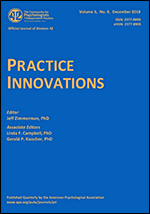Forthcoming article on differentiation of self and cultural competence
A body of research now shows connections between the relational development of differentiation and cultural competence. Josh Hook (U. North Texas) led a project that included Danielsen Research Director Steven Sandage reviewing that literature and outlining implications for clinical practice. The paper was recently accepted for publication in Practice Innovations. This post will be updated when article is available. In the meantime, the abstract is below.

Hook, J.N., Hodge, A., Sandage, S.J., Davis, D.E., & Van Tongeren, D. (in press). Differentiation of self and cultural competence: A systemic review of the empirical literature. Practice Innovations.
Abstract
It is important for psychologists to engage cultural differences in an effective manner. Thus, it is critical to examine personal characteristics that might help psychologists develop cultural competence. The current paper reviewed empirical studies that examined the relationship between differentiation of self and cultural competence. Differentiation of self refers to the ability to self-define (i.e., identify and articulate one’s beliefs, values, and goals) while remaining emotionally connected to others who may be different. Interpersonally, individuals with high differentiation of self are able to balance autonomy and connectedness. Eight empirical studies were reviewed; most studies reported a positive relationship between differentiation of self and cultural competence. Effect sizes ranged from small to medium. Potential moderators included (a) different components of differentiation of self, (b) different ways that cultural competence is assessed, and (c) demographic characteristics of participants. We conclude by discussing limitations, areas for future research, and implications for clinical practice.